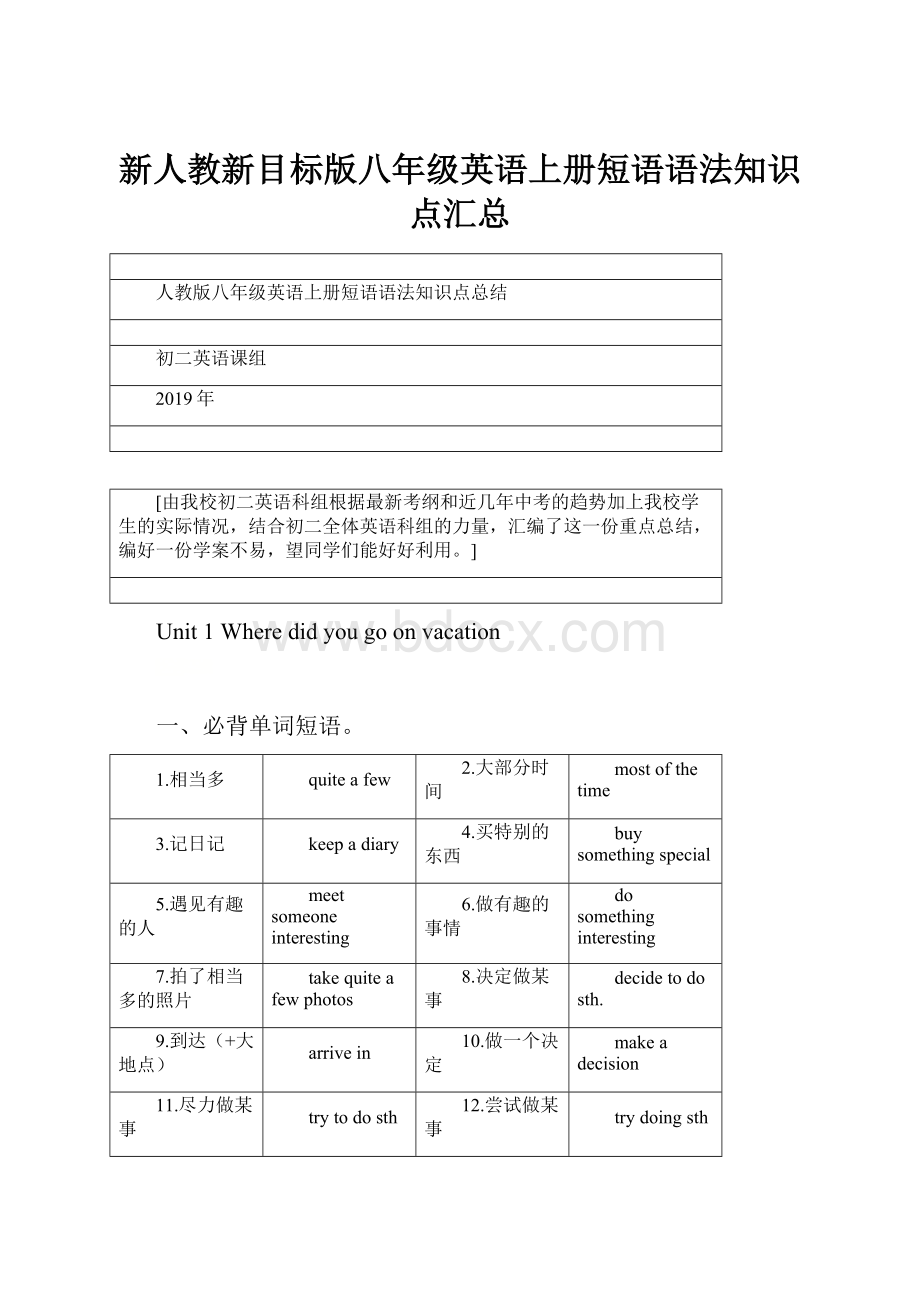新人教新目标版八年级英语上册短语语法知识点汇总.docx
《新人教新目标版八年级英语上册短语语法知识点汇总.docx》由会员分享,可在线阅读,更多相关《新人教新目标版八年级英语上册短语语法知识点汇总.docx(88页珍藏版)》请在冰豆网上搜索。

新人教新目标版八年级英语上册短语语法知识点汇总
人教版八年级英语上册短语语法知识点总结
初二英语课组
2019年
[由我校初二英语科组根据最新考纲和近几年中考的趋势加上我校学生的实际情况,结合初二全体英语科组的力量,汇编了这一份重点总结,编好一份学案不易,望同学们能好好利用。
]
Unit1Wheredidyougoonvacation
一、必背单词短语。
1.相当多
quiteafew
2.大部分时间
mostofthetime
3.记日记
keepadiary
4.买特别的东西
buysomethingspecial
5.遇见有趣的人
meetsomeoneinteresting
6.做有趣的事情
dosomethinginteresting
7.拍了相当多的照片
takequiteafewphotos
8.决定做某事
decidetodosth.
9.到达(+大地点)
arrivein
10.做一个决定
makeadecision
11.尽力做某事
trytodosth
12.尝试做某事
trydoingsth
13.尽某人最大努力做
tryone’sbesttodosth.
14.感受到,觉得
feellike
15.想要做某事(feel)
feellikedoing
16.在过去
inthepast
17.开始做某事
start/begintodo/doing
18.由于+n./pron./v-ing
becauseof
19.等待
waitfor
20.足够的钱
enoughmoney
21另外两个小时
anothertwohours
22.如此…以至于
so…that…
23.与…不同
bedifferentfrom
24.与…相同
thesameas
25.与…相同
thesameas
【教材知识点总结】
SectionA
1.Wheredidyougoonvacation?
(P.1)
onvacation意为“在度假”,结构“on+名词”表示“在某种状态中”。
例句:
MyfamilywenttoHainanonvacationlastyear.
2....visitedmyuncle(P.1)
visit此处用作及物动词,后接人或物做宾语,意为“拜访、看望”,后接表示地点的名词,意为“参观、游览”。
例句:
Ivisitedmygrandmotherlastweek.
例句:
DoyouwanttovisitShanghai?
3....gowithanyone?
(P.2)
(1)anyone用作不定代词,意为“有人、任何人”,相当于anybody,用于疑问句和否定句中,
在肯定句中用someone或者somebody。
但是anyone也可以用在肯定句中,表示“任何一个人”。
例句:
Didyoumeetanyonefriendlyinthatcity?
例句:
Anyonecanbehelpfulinsomeway.
(2)anyone只能指人,不可以指物,后面不接of短语;anyone既可以指人也可以指物,后可接of短语。
例句:
Youcanaskanyoneofusaboutthisquestion.
4....buyanythingspecial?
(P.2)
(1)buy用作双宾语动词,表示“买”,常用的结构为“buysb.sth.”或者“buysth.forsb.”,表示“为某人买某物”。
例句:
Myfatherboughtmeabike.=Myfatherboughtabikeforme.
【拓展】可接双宾语的动词还有give,bring,show,tell,sell等。
givesb.sth.=givesth.tosb.给某人某物
bringsb.sth.=bringsth.tosb.把某物带给某人
showsb.sth.=showsth.tosb.给某人看某物
tellsb.sth.=tellsth.tosb.告诉某人某物
sellsb.sth.=sellsth.tosb.把某物卖给某人
(2)形容词修饰复合不定代词(something/body/one,anything/body/one,nothing/body/one,everything/body/one)时,放在复合不定代词后面。
例句:
Ihave_______________________(一些重要的事情)totellyou.
5.Wetookquiteafewphotosthere.(P.2)
takephotos意为“拍照、照相”,takeaphoto/photosofsb./sth.意为“给……拍照”。
例句:
We_________(take)manyphotosontheGreatWalllastyear.
例句:
Couldyou_______(take)aphotoofus?
6.Ijuststayedathomemostofthetimetoreadandrelax.(P.2)
mostof表示“……中大多数”,后接可数名词或者不可数名词,作主语时,谓语动词单复数取决于后面所接名词的单复数。
例句:
Mostofthefood_________(go)bad.
例句:
Mostofus________(be)goingtothepark.
7.No,Iboughtnothing.(P.3)
nothing用作不定代词,表示“没有任何东西”,相当于notanything。
例句:
Ididnothingspeciallastmonth.=Ididn’tdo____________speciallastmonth.
8.Dideveryonehaveagoodtime?
(P.3)
haveagoodtime表示“玩得开心”,后接动词ing,表示“做某事很开心”,haveagoodtime相当于enjoyoneself/havefun。
例句:
Wehadagoodtimeattheparty.=Weenjoyedourselvesattheparty.
=Wehadfunattheparty.
9.Howdidyoulikeit?
(P.3)
Howdoyoulike...?
意为“你认为……怎么样”,相当于Howdoyoufeelabout...?
或者Whatdoyouthinkof...?
例句:
-Howdoyou_________thefilm?
-Wonderful.
-A.thinkofB.like
10.Didyougoshopping?
(P.3)
goshopping表示“去购物、去买东西”,相当于dosomeshopping。
类似的短语还有:
goswimming,goskating,gofishing,gohiking,goboating,gocamping等。
Iwentshoppingandboughtsomethingformyparents.
11.Ofcourse!
(P.3)
ofcourse意为“当然”,相当于sure或者certainly。
例句:
-MayIborrowyourdictionary?
例句:
-Ofcourse!
12.Stillnooneseemedtobebored.(P.3)
(1)seem用作系动词,表示“似乎、好像”,常用的结构有:
seem+adj./tobe/that+句子。
例句:
Thestory__________(seem)true.
例句:
Whathesaidseemed__________(be)alie.
例句:
It________(seem)thattheyaregoingtopulldownthehouse.
(2)bored表示“感到厌倦的”,用来说明人的感受;boring表示“令人厌烦的、单调的”,用来说明事物的特征。
例句:
Thefilmwassoboringthatalmostanyonefeltbored.
【拓展】以ed结尾的形容词,通常用来修饰或者描述人,以ing结尾的动词,通常用来修饰或者描述物,类似的形容词还有:
interesting/interested;exciting/excited;surprising/surprised。
SectionB
1.Whatactivitiesdoyoufindenjoyable?
(P.5)
(1)find这里表示“发现、觉得”,宾语后常接宾语补足语,常用的结构有:
findsb./sth+n./adj./doingsth./介词短语。
例句:
Thestudentsfind_________(she)akindteacher.
例句:
Ifindthebook_________(use).
例句:
WhenIpassedhishouse,Ifoundhiswife__________(cook).
例句:
Finally,theyfoundtheboyinthetree.
(2)enjoyable是enjoy的形容词形式,表示“有趣的、令人愉快的”。
例句:
I’msurethatwewillhaveanenjoyablevacation.
例句:
ThejobisenjoyableandIlikeit.
2.IarrivedinPenanginMalaysiathismorningwithmyfamily.(P.5)
arrive作不及物动词,表示“到达”,接宾语时,需要加上介词in或者at。
例句:
Whendidyouarrive?
例句:
Wearearrivingatthestationattwoo’clock.
【拓展】reach表示“到达”时,是及物动词,后面直接接表示地点的名词作宾语。
另外两个表示“到达”的动词(get和arrive)都是不及物动词,getto+地点;arrivein/at+地点。
3....sowedecidedtogotothebeachnearourhotel.(P.5)
例句:
decide表示“决定”时,常用的结构为:
decidetodosth.“决定做某事”。
例句:
Thegovernmentdecidedtobuildanotherschoolinthisvillage.
4.MysisterandItriedparagliding.(P.5)
trydoingsth.“尝试做某事”;trytodosth.“尽力做某事”。
例句:
Thedoctortriestosavethesickgirl.
例句:
Theboytriedplayingthepiano.
【拓展】try也可以用作名词,表示“尝试”,haveatry表示“尝试一下”。
I’mgoingtohaveatry.
5.IfeltlikeIwasabird.(P.5)
feellike此处表示“感觉像”,后接从句。
Hefeelslikeheisswimming.
【拓展】feellike还可以表示“想要”,后接名词、代词或者动名词做宾语,
feellikedoingsth.=wouldliketodosth.=wanttodosth.
Doyoufeellike__________(go)outforawalkwithme?
=Wouldyoulike_________(go)outforawalkwithme?
=Doyouwant__________(go)outforawalkwithme?
6.Therearealotofnewbuildingsnow...(P.5)
alotof相当于lotsof表示“许多”,可以用来修饰可数名词复数或者不可数名词。
Thereisalotofraininsummerinthisplace.
【拓展】
只修饰不可数名词的量词有:
alittle,little,agreatdealof,much,toomuch
只修饰可数名词的量词有:
afew,few,several,many,toomany,anumberof
既可以修饰不可数名词也可以修饰可数名词的量词有:
some,any,alotof,lotsof,plentyof
7.Iwonderwhatlifewaslikehereinthepast.(P.5)
wonder表示“好奇、想知道”,后接whether/if,what,who,why等引导宾语从句。
例句:
Iwonderwhattheyaredoingnow.
例句:
Iwonderifyoucanhelpme.
8.Ireallyenjoyedwalkingaroundthetown.(P.5)
enjoy用作及物动词,表示“喜欢”,后接名词、代词或者动名词做宾语。
例句:
Doyouenjoymusic?
例句:
Idon’tenjoysleepingwiththewindowopen.
9.Whatadifferenceadaymakes!
(P.5)
本句是what引导的感叹句,what引导的感叹句常用的结构有:
“What+a/an+形容词+单数可数名词+主语+谓语”或者“What+形容词+可数名词复数/不可数名词+主语+谓语”。
例句:
多么漂亮的一朵花呀!
_________________________________________
例句:
它们是多么有趣的书啊!
_______________________________________
例句:
多大的雪啊!
_________________________________________________
【拓展】how引导的感叹句的结构为“How+形容词/副词+主语+谓语”。
例句:
Howbeautifulthebirdis!
例句:
HowfastMaryruns!
10.Wewantedtowalkuptothetop,butthenitstartedrainingalittlesowedecidedtotakethetrain.(P.5)
(1)want表示“想要”时,为及物动词,后接不定式作宾语或者用于句型“wantsb.todosth.”中,表示“想要某人做某事”。
例句:
Theydon’twanttothrowawaytheoldfurniture.
例句:
Shewantsherparentstopayforthecar.
(2)start后常接名词、动词不定式或者动名词作宾语,用法相当于begin。
例句:
Whenshallwestartthemeeting?
例句:
Let’sstartdiscussing/todiscussaboutthenextproblem.
11.Wewaitedoveranhourforthetrainbecausetherearetoomanypeople.(P.5)
(1)waitforsb./sth.“等待某人或者某事”;waittodosth.“等待做某事”;can’twaittodosth.“迫不及待做某事”
例句:
Wearewaitingfortheresultoftheexam.
例句:
Allthepassengersarewaitingtogetonthebus.
例句:
Thechildrencan’twaittorushoutaftertheclassisover.
(2)over此处表示“多于、超过”,相当于______________。
例句:
Myfatherisover40yearsold.
(3)toomuch,muchtoo和toomany辨析
toomuch
太多(的)
用作形容词,修饰不可数名词
Ihavetoomuchhomeworktodo.
用作副词,修饰动词
Don’teattoomuch.
muchtoo
太
用作副词,修饰形容词和副词
Thepictureismuchtoobeautiful.
toomany
太多的
用作形容词,修饰可数名词复数
Thelittleboyhastoomanyquestionstoask.
12.Andbecauseofthebadweather,wecouldn’tseeanythingbelow.(P.5)
(1)becauseof意为“因为、由于”,后接名词、代词或者动名词,because是连词,引导原因状语从句,后接一个句子。
例句:
Heislateforschool________________thebadweather.
例句:
=Heislateforschool_______________theweatherisbad.
(2)below表示“在……以下、低于”,反义词是above,意为“在……之上,超过”。
例句:
Itwasfivedegreesbelowzerolastnight.
13.Myfatherdidn’tbringenoughmoney...(P.5)
(1)bring表示“带来”,强调从别的地方带到说话的地方,常与副词here连用;take表示“带走”,强调从说话的地方带去别的地方,常与副词there连用;carry表示“搬、抬”,没有方向性。
Thestudentsbroughttheirhomeworktoschoolinthemorningandtakethemhomeafterschool.
(2)enough可以用作形容词,表示“足够的、充分的”,用来修饰名词,可以放在名词前面,也可以放在名词后面。
例句:
Therichmanhasenoughmoney.
例句:
=Therichmanhasmoneyenough.
【拓展】enough还可以用作副词,修饰形容词或者副词,放在形容词或者副词后面,常用的结构为:
be+adj.+enough+todosth.“足够……能够做某事”。
例句:
Theboyis_________________(足够年长)togotoschool.
例句:
Thefatherworks________________(足够努力)forhisfamily.
14.Well,butthenextdaywasnotasgood.(P.5)
当我们要表示双方某方面(如年龄、身高等)程度相同或不同时,常用as…as或notas…as结构,表示“和……一样”或“和……不一样”。
如:
例句:
Maryisas___________asLinda.玛丽和琳达一样仔细。
例句:
Hedoesnotrunas___________asTom.他跑步没有汤姆快。
15....becauseweforgottobringanumbrella.(P.6)
forgettodosth.“忘记做某事”,强调忘记去做某事,实际上也没有做;forgetdoingsth.“忘记做过某事”,强调已经做过某事,但是忘记了。
例句:
Heforgot____________(take)themessagetohisfriend.他忘记给朋友发短信了。
例句:
Don’tforget____________(lock)thedoorwhenyouleave.临走别忘锁门。
例句:
Don’tyouforget____________(meet)meinthestreetyesterday?
难道你不记得昨天从大街上见到我了吗?
16.Whynot?
(P.8)
whynot意为“为什么”,表示提出建议,后接动词原形,相当于whydon’tyou...?
例句:
Whynotgotothepartywithme?
例句:
=Whydon’tyougotothepartywithme?
17.Everyoneinourclasstookabagwithsomefoodandwater.(P.8)
with此处表示“具有、带有”,还可以表示“和……在一起”或者“用”。
例句:
Ioftengotoschoolwithmyfriends.
例句:
Cuttheapplewithaknife.
18.MylegsweresotiredthatIwantedtostop.(P.8)
so...that...意为“如此……以至于……”,用来引导结果状语从句,so是副词,后面接形容词或者副词。
例句:
Ourschoolissobeautifulthateveryonelikesit.
例句:
Herunssofastthatnoonecancatchupwithhim.
【拓展】such...that...引导结果状语从句,表示“如此……以至于……”,such后面接名词短语,名词前经常跟有形容词进行修饰。
例句:
Heissuchasmartboythatwealllikehim.
例句:
Theyaresuchexperiencedworkersthattheywillsolvetheprob